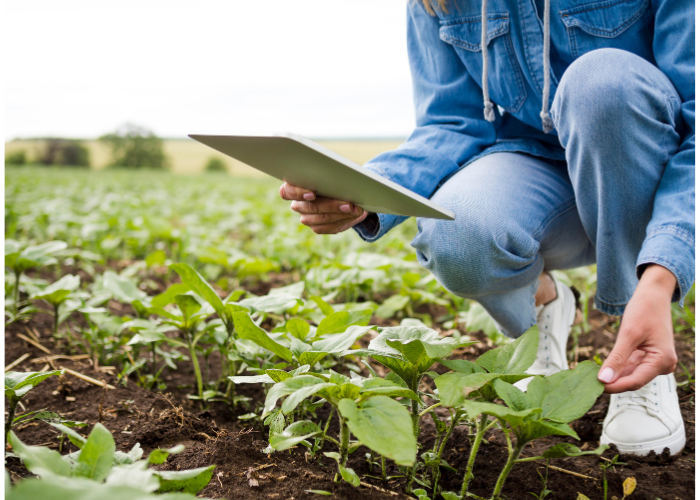Sustainable agriculture: goals to achieve and consumer awarenessBY ISABELLA CECCARINI
- 29 April 2024
- Posted by: Competere
- Category: Senza categoria

Green Deal, climate crisis, food sustainability, research, and innovation in agriculture. Many topics are on the table that could change European agricultural policies. If the entire agri-food chain must manage the green transition, consumers must also play their part, provided they are enabled to do so.
Towards a new agriculture?
Is a new scenario opening up for agriculture? And will consumers be adequately informed to make informed choices? Read the interview to Pietro Paganini by Isabella Ceccarini on Rinnovabili, or by continuing to read down below.
The Green Deal was born as a European response to the climate crisis. It set very challenging environmental goals, which the agri-food world realistically considered unattainable and tainted by an ideological approach. What assessment can you make?
In political processes, assessments are always positive if they lead to pluralistic discussion, the expansion of freedoms, economic prosperity, and knowledge. With the Green Deal, we have learned that we cannot follow ideologies that do not take into account the realities or economic and social issues, nor the possible unintended consequences.
In five years, the world has changed dramatically, but European institutions have not realized it, insisting on rigid and unchanging policies until the tractors (a few) took to the streets. Now there is a rush to go back, to try to correct mistakes. Again, this is not done on a scientific basis typical of the experimental method but following the emotions and political interests of the moment. We risk moving from environmentalist ideology to denialist ideology. Instead, we need a balance between environmental, economic, and social sustainability, which in the USA they call “resilience.”
Agriculture, often demonized as responsible for much of the emissions of greenhouse gases, could become the pivot on which to build the green transition?
Agriculture has been transforming the land for millennia. It is a protagonist and responsible for the change that brings both positive and negative consequences for both humans and the environment. We have now learned that we can cultivate with new techniques, with innovative tools to be more effective, efficient, and sustainable. All this has an economic and temporal cost, meaning economic resources and time are needed to “transition” from an outdated and voracious supply chain to one that is innovative from a structural, organizational, managerial, and technological point of view.
European agriculture is traditionally uncompetitive, living on subsidies (the famous CAP) and struggling to compete with the intensive practices of some countries or the distorting practices of others. Yet Europe can easily become a leader in precision agriculture. But it requires a clear and courageous reform of the sector, shortening supply chains (especially in Italy) and consolidating them. “Small is beautiful” can work if framed in a system of consolidated supply chains, capable of achieving economies of scale or exporting high quality.
The three pillars of sustainability – environmental, economic, and social – are interconnected. Have European policies, in your opinion, given the right value to agriculture and the work of farmers? Two elements on which food security is based.
In the last five years, farmers and the agri-food sector in general, whether small agricultural enterprises or large food conglomerates, have been cornered and blamed for the climate drama and the loss of biodiversity.
A short-sighted green ideology often coagulated with financial interests in new commercial ventures in the so-called green-tech or food-tech sector has prevailed. Innovation. Yes, but disruptive innovation, however, does not impose itself by law, discarding everything that was there before and on which, moreover, hundreds of billions have been invested in subsidies. So, suddenly, a few months were enough to discover that the “king is naked.”
Agriculture and food are the energy that keeps us alive, and shiny innovation is still far from the numbers needed to feed 500 million Europeans and 8 billion citizens of the world. That’s why it is necessary to innovate existing agri-food by valuing it. Welcome cultured meat or plant proteins, or laboratory drinks, but let the market acclaim them, rather than artificial laws imposed by a deterministic “pseudo-science” that rises above the interests of citizens.
Do you believe that innovation and research play a decisive role in sustainable agriculture?
Yes, absolutely. Precision agriculture is the necessary step to make productivity more efficient, reduce waste, improve quality, while preserving or, indeed, regenerating the environment.
But, as I said, economic and human resources are needed, and time. A European plan is needed, networks of universities and research centers, farmers, and supply chains willing to change and consolidate, patents, and their necessary protection, incentives to produce more for export rather than to produce less for necessity.
We need managers and entrepreneurs to manage companies. Have you ever heard of a Bocconi graduate who wants to run a farm? The solution to the problem lies in understanding the response.
Insects, cultured meat, assisted evolution techniques: will they truly be the future of food sustainability? Could a food education that teaches to make natural but more responsible choices based on balanced diets, local and seasonal products be equally effective?
What will be will be determined by citizens and operators through their choices. The role of the legislator is to support competition rules, ensuring that everyone has the opportunity to participate while respecting the health and safety of citizens. It is also to favor some industrial policies over others, always in the interest of freedoms and the well-being of citizens.
Among the duties of a State towards its citizens is to provide tools and access to knowledge to make free and informed choices. The State should not dictate what health is and how to achieve it, but provide guidelines so that each individual can make their own choices, and thus find their balance. The State should not promote health, but balance. The idea of health changes over time, evolves, while balance is the method that helps to choose in one’s own interest to live better and longer.
What should be the cornerstones of an agricultural policy that, starting from the present, can outline a sustainable future?
First of all, shorten and consolidate supply chains, then invest in innovation to favor productivity and resilience. But above all, put the agri-food sector back at the center of politics and industrial policy by balancing environmental, economic, and social interests. The agri-food sector is where we derive the energy necessary to live better and longer. Finally, educate citizens so that they know what they eat, make informed choices, and above all understand the dynamics behind it.
.
Read Smart agriculture to mitigate climate change: benefits for italian agrifood
Image credits: courtesy of Freepik >>>

